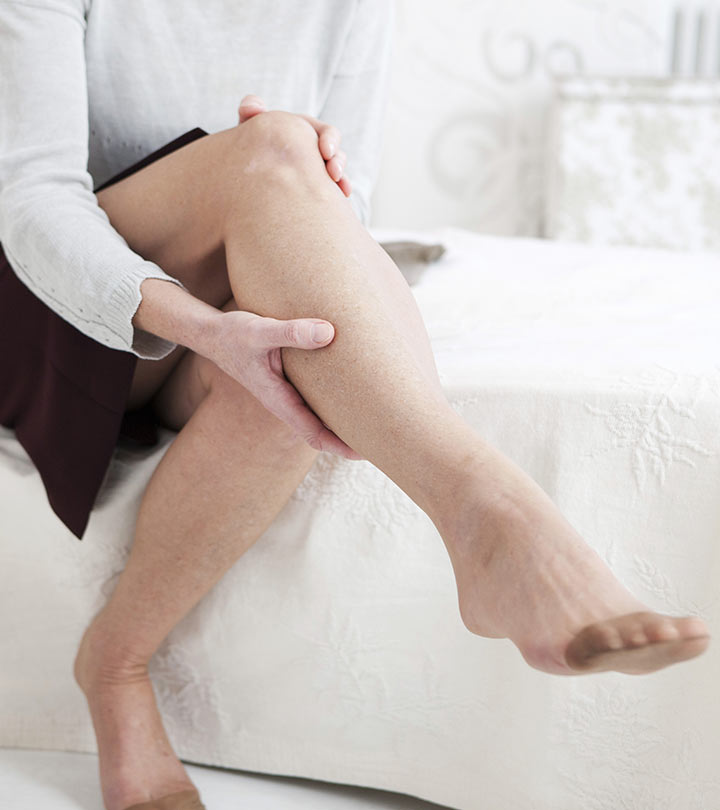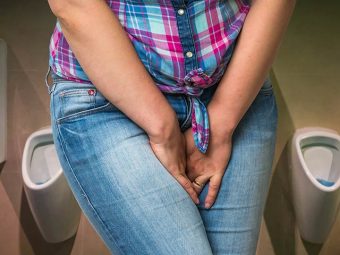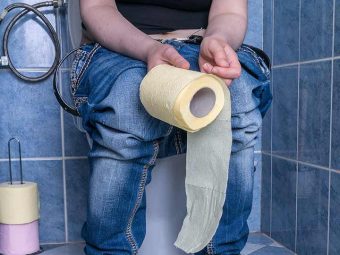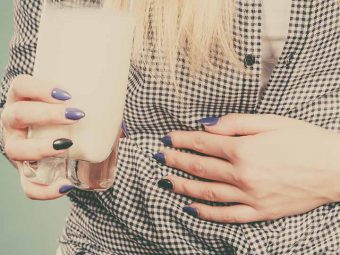25 Remedies To Treat Edema Naturally + Signs, Causes, & Types
Assuage edematous swelling with organic solutions before the condition escalates.

A person develops edema when excess fluid builds up in the body’s tissues, causing swelling in the affected area. Commonly seen in the hands and legs, edema affects any part of the body and is considered as edematous. While it goes away on its own, there are a few home remedies for edema one can try to reduce the swelling.
Painful and uncomfortable, edema can be the result of pregnancy, medications, or standing on your feet for long periods. In this article, we discuss the symptoms and causes of edema along with a few remedies one can try to alleviate the symptoms.
In This Article
How To Treat Edema Naturally
1. Green Tea
Green tea has stimulating and diuretic properties (1). This may help in metabolizing extra fluids in the body. This, in turn, may also help in treating edema.
You Will Need
- 1 teaspoon green tea extract
- 1 cup of water
- Honey (optional)
What You Have To Do
- Add green tea extract to water and bring this to a boil in a saucepan.
- Add honey for flavor and consume immediately.
How Often You Need To Do This
Do this 2-3 times a day.
2. Grape Seed Extract
Grape seed extract possesses antioxidant properties (2). This may be used in the treatment of edema.
You Will Need
Grape seed extract supplement (100 mg)
What You Have To Do
Include grape seed extract supplements in your diet.
How Often You Need To Do This
Consume this supplement 2 times a day.
3. Juniper Oil
Juniper oil exhibits antioxidant properties (3). It is also believed to possess diuretic and detoxifying properties. Hence, use of juniper oil may help in reducing the swelling and water retention caused by edema.
You Will Need
- 5-6 drops of juniper oil
- 30 ml of a carrier oil (olive or coconut oil)
What You Have To Do
- Mix the essential oil with the carrier oil.
- Apply this mixture on the swollen areas.
How Often You Need To Do This
Do this 2 times a day.
4. Olive Leaf Extract
Olive leaf extract contains bioactive compounds that have antioxidant and anti-inflammatory properties (4). These properties may help in reducing inflammation and oxidative stress caused by brain edema.
You Will Need
Olive leaf extract capsules (500 mg)
What You Have To Do
Include olive leaf extract capsules in your daily diet.
How Often You Need To Do This
Consume this once a day.
5. Cranberry Juice
Cranberries are rich in many minerals, such as calcium and potassium. They also exhibit diuretic properties (5). These properties may make cranberries an excellent natural remedy for the treatment of edema.
You Will Need
Cranberry juice (unsweetened)
What You Have To Do
Drink a cup of cranberry juice.
How Often You Need To Do This
Do this once a day.
6. Celery Seed Extract
Celery seed extract, scientifically referred to as Apium graveolens, is a diuretic with anti-inflammatory and antimicrobial properties (6). Thus, it may be used to treat edema.
You Will Need
250-500 mg celery seed extract supplement
What You Have To Do
Include celery seed extract supplements in your diet after consulting your doctor.
How Often You Need To Do This
Consume this supplement daily or as directed by your physician.
7. Horse Chestnut Seed Extract
Horse chestnut is a diuretic. It also contains escin that exhibits anti-inflammatory and anti-edematous properties (7). Together, these properties of horse chestnut extract may help combat edema and its symptoms.
You Will Need
Horse chestnut seed extract (200 mg)
What You Have To Do
Consume 200 mg of horse chestnut seed extract daily.
How Often You Need To Do This
Consume this supplement daily after consulting a doctor.
8. Pineapple Juice
Pineapples are rich in a compound called bromelain that has anti-inflammatory properties (8). This may help in the treatment of edema and its symptoms.
You Will Need
- 1/4 pineapple
- 1 cup of water
What You Have To Do
- Remove the pineapple skin and cut it into small pieces.
- Blend this in a mixer with water and consume the juice immediately.
How Often You Need To Do This
Do this once a day.
9. Massage Therapy
Massaging improves blood circulation (9). This may help in the treatment of edema.
You Will Need
- 5-6 drops of any essential oil like grapefruit or juniper oil
- 30 ml of a carrier oil like coconut oil
What You Have To Do
- Mix the essential oil with the carrier oil.
- Massage the blend gently on your leg for 5 to 10 minutes.
How Often You Need To Do This
Do this 2 times a day.
Note: Keep your leg elevated for 15 minutes before the massage. Doing this ensures that the fluid pooled in the swollen area of your body may flow back. As a result, the water retention in the affected area reduces.
10. Turmeric
Turmeric contains a compound called curcumin, which has anti-inflammatory and detoxifying properties (10). These properties may help in treating the swelling and pain associated with edema.
You Will Need
- 1 teaspoon turmeric powder
- 1 glass of milk or water
What You Have To Do
- Mix the turmeric in a glass of warm water or hot milk.
- Consume it immediately.
- Alternatively, you can also mix a teaspoon of turmeric with a few drops of water to make a paste. This paste can then be applied on the areas of your body affected by edema.
How Often You Need To Do This
Follow this remedy every morning and night until you see the edema disappear.
11. Apple Cider Vinegar
Apple cider vinegar has many health benefits. It has anti-inflammatory properties and also contains potassium (11). Potassium may help in reducing fluid retention, while the anti-inflammatory properties of apple cider vinegar may help treat inflamed skin.
You Will Need
- 2 cups of apple cider vinegar (ACV)
- 2 cups of warm water
- A clean towel
What You Have To Do
- Mix apple cider vinegar and warm water in a bowl.
- Soak a clean towel in the mixture and wrap the swollen areas with it.
- Leave it on for 5 minutes.
- Repeat the process using a mixture of cold water and vinegar.
How Often You Need To Do This
Do this 2 times a day until the swelling disappears.
12. Vitamins
It is believed that vitamins reduce water retention and are anti-inflammatory. Thus, they may be used in treating edema and its symptoms. However, there is no scientific research to prove these effects.
You Will Need
- A multivitamin supplement that consists of Vitamins A, C, E
- B-complex vitamins
- Trace minerals like magnesium, calcium, selenium, and zinc
What You Have To Do
Consume a multivitamin consisting of the above vitamins and minerals after consulting your doctor.
How Often You Need To Do This
Consume this once a day.
13. Hot Or Cold Compress
Applying a hot compress increases blood flow to the affected area. This reduces the pain and inflammation associated with edema. Similarly, applying a cold compress numbs the affected area and reduces swelling and inflammation (12).
You Will Need
- Cold water
- Warm water
- A clean towel
What You Have To Do
- Soak a clean towel in warm water.
- Wrap this towel around the swollen area.
- Leave this on for 5 minutes and unwrap.
- Soak the towel in cold water and repeat the procedure.
How Often You Need To Do This
Do this 2 times a day until the swelling disappears.
14. Crushed Flax Seeds
Flax seeds are a rich source of omega-3 fatty acids. These fats can help in eliminating toxins from the body and ensuring that the organs are functioning properly (13). Hence, flax seeds may help in treating edema by addressing its root cause.
You Will Need
1 teaspoon of crushed flax seeds
What You Have To Do
- Mix the crushed flax seeds in a glass of warm water.
- Consume immediately.
How Often You Need To Do This
Do this 2 times a day.
15. Mustard Oil
Mustard oil contains allyl isothiocyanate, which was found to reduce inflammation in animal studies (14). Hence, it may relieve the pain associated with edema.
You Will Need
1/2 cup of mustard oil
What You Have To Do
- Warm the mustard oil.
- Massage this gently onto the affected area.
How Often You Need To Do This
Do this 2 times a day.
16. Coriander Seeds
Coriander seeds possess diuretic and anti-inflammatory properties (15). These properties may help in treating edema.
You Will Need
- 3 teaspoons coriander seeds
- 1 cup of water
What You Have To Do
- Add the coriander seeds and water to a saucepan.
- Bring this mixture to a boil until the water is reduced to half its quantity.
- Allow it to cool. Consume the strained liquid immediately.
How Often You Need To Do This
Do this 2 times a day.
17. Tea Tree Oil
Tea tree oil exhibits strong analgesic and anti-inflammatory properties (16). This may help in treating the swelling and pain associated with edema.
You Will Need
- Tea tree essential oil
- Cotton pads
What You Have To Do
- Pour around 4-5 drops of tea tree oil on a cotton pad.
- Apply it gently to the swollen area.
How Often You Need To Do This
Do this 2 times a day.
18. Dandelion Tea
Dandelion is known for its natural antioxidant and diuretic properties (17). Hence, this may be used to reduce fluid retention associated with edema.
You Will Need
- 1 teaspoon dandelion tea extract
- 1 cup of water
- Honey (optional)
What You Have To Do
- Add the dandelion tea extract to water and bring it to a boil in a saucepan.
- Strain and allow it to cool.
- Add honey for flavor and consume this tea.
How Often You Need To Do This
Do this 2 times a day.
19. Parsley Leaves
Parsley is a natural diuretic and may help in flushing toxins and extra fluid from the body (18). It is one of the best herbs that may be used to treat edema.
You Will Need
- 1/2 -1 cup of parsley leaves
- 1 L boiled water
What You Have To Do
- Cut the parsley leaves into smaller pieces and soak them in water.
- Strain the water.
- Add honey for flavor and consume it throughout the day.
How Often You Need To Do This
Consume parsley tea daily at regular intervals.
20. Ginger Tea
Ginger contains a compound called zingerone that can help treat edema (19).
You Will Need
- 1 or 2 inches of ginger
- 1 cup of water
- Warm milk (optional)
What You Have To Do
- Crush a small piece of ginger and boil it in a cup of water.
- Strain and consume the mixture before it turns cold.
- Alternatively, you can also chew on a piece of ginger or consume a teaspoon of dried ginger powder with a glass of warm milk.
How Often You Need To Do This
Do this once a day.
21. Nettle Tea
Stinging nettle is highly nutritious and has anti-inflammatory properties (20). It can eliminate toxins and extra fluids from the body by stimulating the functioning of the kidneys. These properties of stinging nettle may help in the treatment and subsequent elimination of edema and its symptoms.
You Will Need
- 1 teaspoon of dried nettle leaves
- 1 cup of water
What You Have To Do
- Add the dried nettle leaves to a cup of water and bring it to a boil.
- Strain the water and consume the tea before it turns cold.
- You can also add honey for flavor.
How Often You Need To Do This
Drink this tea 3 times daily.
22. Oregano Oil
Oregano oil is anti-inflammatory and antiseptic (21). This may help in reducing the swelling and pain associated with edema.
You Will Need
- 5-6 drops of oregano oil
- 30 ml of any carrier oil (almond oil or olive oil)
What You Have To Do
- Mix oregano oil with a carrier oil of your choice.
- Massage this blend gently onto the affected area.
How Often You Need To Do This
Do this 2 times a day.
23. Castor Oil
Castor oil contains ricinoleic acid that exhibits anti-inflammatory properties (22). This may be of great use in treating the swelling and inflammation that come with edema.
You Will Need
Castor oil
What You Have To Do
Massage some castor oil on the swollen areas of your body.
How Often You Need To Do This
Do this 2 times a day.
24. Epsom Salt Bath
Epsom salt is also referred to as magnesium sulfate, which has anti-inflammatory properties (23). This may reduce swelling and inflammation.
You Will Need
- 1 cup of Epsom salt
- Water
What You Have To Do
- Add Epsom salt to your bath water.
- Soak and relax in the bath for 15 to 20 minutes.
- Alternatively, you can also add half a cup of Epsom salt to a bucket of warm water and soak your swollen legs in it for 10 to 15 minutes.
How Often You Need To Do This
Do this at least once a day.
25. Tart Cherry Juice
Tart cherries are rich in antioxidants. The antioxidant nature of tart cherries is known to be effective in treating swelling and pain associated with edema (24).
You Will Need
1 glass of unsweetened tart cherry juice
What You Have To Do
Drink a glass of unsweetened tart cherry juice.
How Often You Need To Do This
Do this 2 times a day.
In addition to these home remedies, there are other methods to treat edema. They are discussed below.
Other Ways
a) Gloves
These gloves are specially designed for treating edema. They may provide gentle compression and warmth to the affected area and treat edema.
You Will Need
Therapeutic edema gloves
What You Have To Do
Wear therapeutic edema gloves if you notice swelling in your hands.
How Often You Need To Do This
Wear the gloves throughout the day and remove them only when you want to bathe or wash.
b) Kinesio Tape
This tape creates a negative pressure on the area where it is applied and may help to drain any extra fluid and swelling.
You Will Need
Kinesio tape
What You Have To Do
Apply strips of this tape directly over the swollen area.
How Often You Need To Do This
Continue wearing this tape for 3 to 5 days at a time.
c) Wear Compression Socks
Compression socks may help in treating edema by promoting blood flow in swollen legs.
You Will Need
Compression socks
What You Have To Do
Wear compression socks daily.
How Often You Need To Do This
Do this daily until you see an improvement in your condition.
d) Leg Pumps
Compression pumps are designed to treat edema and lymphedema. These pumps may promote the circulation of fluid in the affected area and reduce swelling.
You Will Need
Compression leg pumps
What You Have To Do
Wear the compression leg pumps on the affected leg.
How Often You Need To Do This
Do this daily until you notice a positive change in your condition.
These are some of the best remedies that may help in the treatment of edema. Certain lifestyle changes may enhance the effect of these remedies as well as prevent the recurrence of edema.
Tips To Prevent Edema
- Do not indulge in activities that require you to sit or stand for long periods.
- Elevate your legs every now and then.
- Limit your salt intake.
- Exercise every day.
- Keep yourself well hydrated in hot weather.
- Avoid rigorous workouts and take breaks in between.
- Avoid smoking.
- Do not sit continuously for more than 3 hours.
Let us now understand the causes of edema.
What Causes Edema?
Edema is usually a result of an injury to the body, such as a fracture or an infection. Bee stings may also result in edema. In the case of infections, edema is more of a help because the fluid released as a result of infection usually consists of white blood cells (WBCs), and these cells are involved in fighting against infections. Other than these, edema may also be a result of some other serious underlying complications, like:
- Hypoalbuminemia: This is a condition that may result in edema. It is a term for deficiency of albumin and other proteins in your body (25).
- Allergy: Edema may also be an allergic reaction to an allergen. This is because, in case of an invasion by a foreign body, your vessels leak fluid in the affected area to fight any probable infection.
- Blood Clot: A blood clot in any of the body parts may also lead to edema. Similarly, any condition that obstructs the flow of fluids in the body may lead to the development of edema.
- Medical Conditions: Edema is usually a result of serious health issues like heart and liver diseases. Both these conditions may obstruct or slow down the flow of body fluids, and this may result in edema (26).
- Head Injury: Any injury to the head that results in a block in the drainage of cerebral fluid may also cause edema.
- Pregnancy: Edema is quite common among pregnant women. It usually occurs in the legs during pregnancy.
Edema often affects only certain parts of the body. There are different types of edema, and they are usually named according to the body parts they affect. Let’s take a look at them now.
What Are The Types Of Edema?
- Peripheral Edema: When there is a swelling in the hands or legs, it is usually referred to as peripheral edema. It may be due to cellulitis, lymphadenitis, heart failure, liver failure, or the side effects of antihypertensive medicines.
- Pulmonary Edema: When there is fluid retention in the lungs, it is called pulmonary edema. This is a serious condition and is often a result of another medical problem, like heart failure or lung injury (27).
- Cerebral Edema: This usually happens when there is an obstruction in the flow of fluid in the brain. This is also a critical condition and requires an immediate check-up (28). It may be seen after a head injury or infections, like viral encephalitis, dengue, and malaria.
- Macular Edema: When there is a fluid obstruction in the macula of the eyes, it is referred to as macular edema. The macula is a part of the eyes that is responsible for enabling detailed vision (29). It may be associated with diabetes or hypertension.
Edema may affect other body parts as well, but the ones mentioned above are the most common areas affected by this condition.
The onset of edema is usually followed by a series of symptoms that may be painful in some circumstances.
Signs And Symptoms Of Edema
The symptoms associated with edema usually vary depending on its type and location. However, pain, swelling, and a feeling of tightness in the affected area are usually common symptoms of edema. Some of its other symptoms include:
- Stretched and swollen skin
- Skin that dimples on being pressed
- Puffiness of the affected area
- Pain in the affected body part
- Stiffness in the joints
- The veins in the hand and neck become fuller
- Higher blood pressure
- Pain in the abdomen
- A feeling of nausea
- Vomiting
- Weakness
- Abnormalities in your vision
Note: One may be sure that may have edema if the swollen part of the body dimples upon being pressed.
Infographic: Edema In Different Parts Of The Body
Edema might be noticed in a small isolated area, caused by a simple mosquito bite, which resolves on its own. Or it can also affect the entire body. A twisted ankle, an allergic reaction, a bee sting, or a skin infection are some common causes of edema.
To be able to properly detect edema, you should look out for its common symptoms. But these symptoms vary with the amount of edema and the body part it affects. Check out the infographic below to learn how edema appears in different body parts.
Illustration: StyleCraze Design Team
Edema refers to the swelling of body parts, most commonly the hands or feet, that result from fluid accumulation. Injuries, infections, certain medications, insect bites, or stings may cause edemas. In addition, some medical conditions and health complications may lead to edemas like blood clots, brain injury, hypoalbuminemia, and pregnancy. Depending on the cause and symptoms, edemas can be categorized into different types like peripheral edema, macular edema, pulmonary edema, and cerebral edema. Tart cherry juice, Epsom salt bath, cold and hot compress, some herbal teas, apple cider vinegar, natural oils, and turmeric are some of the most commonly used remedies to cure edema. If the home remedies do not bring down the swelling, you need to consult your healthcare provider as certain edemas may indicate underlying health concerns.
Frequently Asked Questions
How do you know if you have edema?
You can be sure that you have edema if the swollen part of your body dimples upon being pressed.
What is the best diet to follow for edema?
Increase your intake of foods with antioxidant and anti-inflammatory properties such as berries, vegetables, fish, olive oil, and whole grains.
What are the foods that should be avoided if you have edema?
If you have edema, avoid alcohol and dairy products. You should also avoid any diet with high sodium content such as cheese and other processed foods.
How long does it take for edema to go away?
Depending on its cause, edema can last from 30 minutes to more than a month. However, if the swelling persists even after a month, it is best to see your physician.
What will happen if edema is left untreated?
If edema is left untreated, it can lead to painful swelling and scarring of tissues. Edema could also be a symptom of a more serious medical complication, and thus, you must get it checked if there is no improvement in your condition.
Sources
- Suzuki, Yasuo, Noriyuki Miyoshi, and Mamoru Isemura. “Health-promoting effects of green tea.”Proceedings of the Japan Academy, Series B3 (2012): 88-101.
https://www.ncbi.nlm.nih.gov/pmc/articles/PMC3365247/ - Chedea, Veronica Sanda, et al. “Antioxidant/prooxidant and antibacterial/probacterial effects of a grape seed extract in complex with lipoxygenase.”BioMed research international 2014 (2014).
https://www.ncbi.nlm.nih.gov/pmc/articles/PMC4181939/ - Höferl, Martina, et al. “Chemical composition and antioxidant properties of Juniper berry (Juniperus communis L.) essential oil. Action of the essential oil on the antioxidant protection of Saccharomyces cerevisiae model organism.”Antioxidants1 (2014): 81-98.
https://www.ncbi.nlm.nih.gov/pmc/articles/PMC4665443/ - Ghanbari, Rahele, et al. “Valuable nutrients and functional bioactives in different parts of olive (Olea europaea L.)—a review.”International journal of molecular sciences3 (2012): 3291-3340.
https://www.ncbi.nlm.nih.gov/pmc/articles/PMC3317714/ - Skrovankova, Sona, et al. “Bioactive compounds and antioxidant activity in different types of berries.”International journal of molecular sciences10 (2015): 24673-24706.
https://www.ncbi.nlm.nih.gov/pmc/articles/PMC4632771/ - Al-Asmari, Abdulrahman Khazim, Md Tanwir Athar, and Saeed G. Kadasah. “An updated phytopharmacological review on medicinal plant of Arab region: Apium graveolens linn.”Pharmacognosy reviews21 (2017): 13.
https://www.ncbi.nlm.nih.gov/pmc/articles/PMC5414449/ - Gallelli, Luca. “Escin: a review of its anti-edematous, anti-inflammatory, and venotonic properties.” Drug design, development and therapy 13 3425-3437.
https://www.ncbi.nlm.nih.gov/pmc/articles/PMC6776292/ - Maurer, H. R. “Bromelain: biochemistry, pharmacology and medical use.”Cellular and Molecular Life Sciences CMLS9 (2001): 1234-1245.
https://link.springer.com/article/10.1007/PL00000936 - Jung, Geum-Sook, et al. “Effects of meridian acupressure massage on body composition, edema, stress, and fatigue in postpartum women.”The Journal of Alternative and Complementary Medicine10 (2017): 787-793.
https://pubmed.ncbi.nlm.nih.gov/28714769/ - Rahmani, Arshad Husain et al. “Role of Curcumin in Disease Prevention and Treatment.” Advanced biomedical research vol. 7 38.
https://www.ncbi.nlm.nih.gov/pmc/articles/PMC5852989/ - Johnston, Carol S., and Cindy A. Gaas. “Vinegar: medicinal uses and antiglycemic effect.”Medscape General Medicine2 (2006): 61.
https://www.ncbi.nlm.nih.gov/pmc/articles/PMC1785201/ - Purwaningsih, A., H. Rahayu, and Kartika Wijayanti. “Effectiveness of warm compress and cold compress to reduce laceration perineum pain on primiparous at Candimulyo Magelang 2015.”Int J Res Med Sci1 (2015): S24-9.
https://www.msjonline.org/index.php/ijrms/article/viewFile/2539/2407 - Zivkovic, Angela M., et al. “Dietary omega-3 fatty acids aid in the modulation of inflammation and metabolic health.”California agriculture3 (2011): 106.
https://www.ncbi.nlm.nih.gov/pmc/articles/PMC4030645/ - Davaatseren, Munkhtugs, et al. “Allyl isothiocyanate ameliorates angiogenesis and inflammation in dextran sulfate sodium-induced acute colitis.” PloS one 9.7 (2014).
https://journals.plos.org/plosone/article?id=10.1371/journal.pone.0102975 - Nadeem, Muhammad, et al. “Nutritional and medicinal aspects of coriander (Coriandrum sativum L.).” British Food Journal (2013).
https://www.researchgate.net/publication/236879895_Nutritional_and_medicinal_aspects_of_coriander_Coriandrum_sativum_L_A_review - Carson, C. F., K. A. Hammer, and T. V. Riley. “Melaleuca alternifolia (tea tree) oil: a review of antimicrobial and other medicinal properties.”Clinical microbiology reviews1 (2006): 50-62.
https://www.ncbi.nlm.nih.gov/pmc/articles/PMC1360273/ - Hu, Chun, and David D. Kitts. “Antioxidant, prooxidant, and cytotoxic activities of solvent-fractionated dandelion (Taraxacum officinale) flower extracts in vitro.”Journal of agricultural and food chemistry1 (2003): 301-310.
https://pubs.acs.org/doi/abs/10.1021/jf0258858 - Farzaei, Mohammad Hosein, et al. “Parsley: a review of ethnopharmacology, phytochemistry and biological activities.”Journal of Traditional Chinese Medicine6 (2013): 815-826.
https://pubmed.ncbi.nlm.nih.gov/24660617/ - Morimoto, Yasuo, and Yujiro Shibata. “Effects of various fragrant ingredients on desmopressin-induced fluid retention in mice.”Yakugaku zasshi: Journal of the Pharmaceutical Society of Japan7 (2010): 983-987.
https://pubmed.ncbi.nlm.nih.gov/20606379/ - Said, A. A. H., et al. “Highlights on nutritional and therapeutic value of stinging nettle (Urtica dioica).”International Journal of Pharmacy and Pharmaceutical Sciences10 (2015): 8-14.
https://www.researchgate.net/publication/283675999_Highlights_on_nutritional_and_therapeutic_value_of_stinging_nettle_Urtica_Dioica - Can Baser, K. H. “Biological and pharmacological activities of carvacrol and carvacrol bearing essential oils.”Current pharmaceutical design29 (2008): 3106-3119.
https://pubmed.ncbi.nlm.nih.gov/19075694/ - Vieira, C et al. “Effect of ricinoleic acid in acute and subchronic experimental models of inflammation.” Mediators of inflammation vol. 9,5 (2000): 223-8.
https://www.ncbi.nlm.nih.gov/pmc/articles/PMC1781768/ - Lin, C. Y., et al. “L-type calcium channels are involved in mediating the anti-inflammatory effects of magnesium sulphate.”British journal of anaesthesia1 (2010): 44-51.
https://academic.oup.com/bja/article/104/1/44/263405 - Carson, Cindy Alberts. “Tart Cherry Juice as a Treatment for Peripheral Neuropathy.”Integrative Medicine: A Clinician’s Journal1 (2015): 48.
https://www.ncbi.nlm.nih.gov/pmc/articles/PMC4566454/ - Coulthard, Malcolm. “Oedema in kwashiorkor is caused by hypoalbuminaemia.”Paediatrics and international child health 35.2 (2015): 83-89.
https://www.ncbi.nlm.nih.gov/pmc/articles/PMC4462841/ - Gao, Hao, et al. “Highly automatic quantification of myocardial oedema in patients with acute myocardial infarction using bright blood T2-weighted CMR.”Journal of Cardiovascular Magnetic Resonance1 (2013): 28.
https://www.ncbi.nlm.nih.gov/pmc/articles/PMC3621376/ - Farber, Sidney. “Studies on pulmonary edema: II. The pathogenesis of neuropathic pulmonary edema.”Journal of Experimental Medicine4 (1937): 405-411.
https://www.ncbi.nlm.nih.gov/pmc/articles/PMC2133578/ - Stokum, Jesse A., Volodymyr Gerzanich, and J. Marc Simard. “Molecular pathophysiology of cerebral edema.”Journal of Cerebral Blood Flow & Metabolism3 (2016): 513-538.
https://www.ncbi.nlm.nih.gov/pmc/articles/PMC4776312/ - Karim, Rushmia, et al. “Interventions for the treatment of uveitic macular edema: a systematic review and meta-analysis.”Clinical ophthalmology (Auckland, NZ) 7 (2013): 1109.
https://www.ncbi.nlm.nih.gov/pmc/articles/PMC3685443/



![edema in different parts of the body [infographic]](https://cdn2.stylecraze.com/wp-content/uploads/2022/07/Edema-In-Different-Parts-Of-The-Body.jpg)









